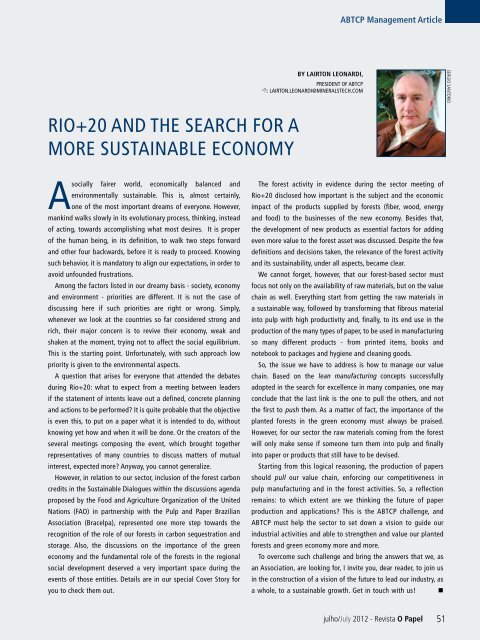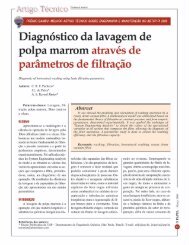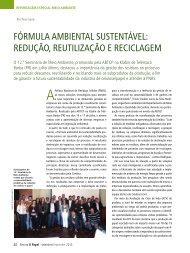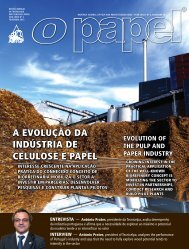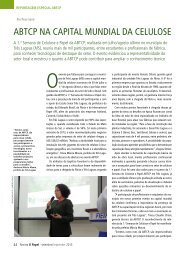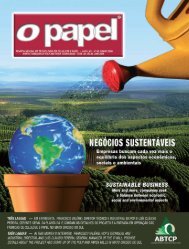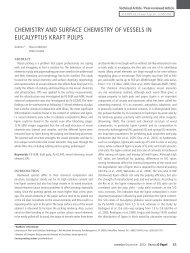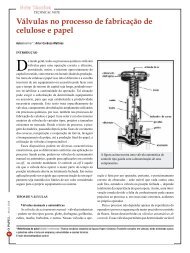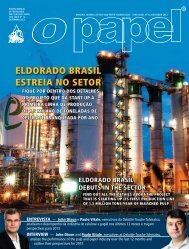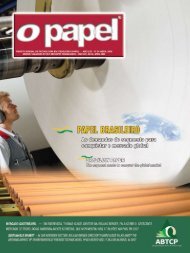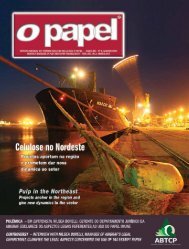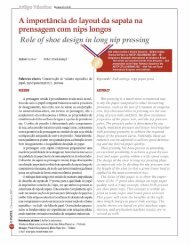You also want an ePaper? Increase the reach of your titles
YUMPU automatically turns print PDFs into web optimized ePapers that Google loves.
ABTCP Management Article<br />
By Lairton Leonardi,<br />
president of ABTCP<br />
: lairton.leonardi@mineralstech.com<br />
Sergio Santorio<br />
<strong>RIO+20</strong> and the search for a<br />
more sustainable economy<br />
A<br />
socially fairer world, economically balanced and<br />
environmentally sustainable. This is, almost certainly,<br />
one of the most important dreams of everyone. However,<br />
mankind walks slowly in its evolutionary process, thinking, instead<br />
of acting, towards accomplishing what most desires. It is proper<br />
of the human being, in its definition, to walk two steps forward<br />
and other four backwards, before it is ready to proceed. Knowing<br />
such behavior, it is mandatory to align our expectations, in order to<br />
avoid unfounded frustrations.<br />
Among the factors listed in our dreamy basis - society, economy<br />
and environment - priorities are different. It is not the case of<br />
discussing here if such priorities are right or wrong. Simply,<br />
whenever we look at the countries so far considered strong and<br />
rich, their major concern is to revive their economy, weak and<br />
shaken at the moment, trying not to affect the social equilibrium.<br />
This is the starting point. Unfortunately, with such approach low<br />
priority is given to the environmental aspects.<br />
A question that arises for everyone that attended the debates<br />
during Rio+20: what to expect from a meeting between leaders<br />
if the statement of intents leave out a defined, concrete planning<br />
and actions to be performed It is quite probable that the objective<br />
is even this, to put on a paper what it is intended to do, without<br />
knowing yet how and when it will be done. Or the creators of the<br />
several meetings composing the event, which brought together<br />
representatives of many countries to discuss matters of mutual<br />
interest, expected more Anyway, you cannot generalize.<br />
However, in relation to our sector, inclusion of the forest carbon<br />
credits in the Sustainable Dialogues within the discussions agenda<br />
proposed by the Food and Agriculture Organization of the United<br />
Nations (FAO) in partnership with the Pulp and Paper Brazilian<br />
Association (Bracelpa), represented one more step towards the<br />
recognition of the role of our forests in carbon sequestration and<br />
storage. Also, the discussions on the importance of the green<br />
economy and the fundamental role of the forests in the regional<br />
social development deserved a very important space during the<br />
events of those entities. Details are in our special Cover Story for<br />
you to check them out.<br />
The forest activity in evidence during the sector meeting of<br />
Rio+20 disclosed how important is the subject and the economic<br />
impact of the products supplied by forests (fiber, wood, energy<br />
and food) to the businesses of the new economy. Besides that,<br />
the development of new products as essential factors for adding<br />
even more value to the forest asset was discussed. Despite the few<br />
definitions and decisions taken, the relevance of the forest activity<br />
and its sustainability, under all aspects, became clear.<br />
We cannot forget, however, that our forest-based sector must<br />
focus not only on the availability of raw materials, but on the value<br />
chain as well. Everything start from getting the raw materials in<br />
a sustainable way, followed by transforming that fibrous material<br />
into pulp with high productivity and, finally, to its end use in the<br />
production of the many types of paper, to be used in manufacturing<br />
so many different products - from printed items, books and<br />
notebook to packages and hygiene and cleaning goods.<br />
So, the issue we have to address is how to manage our value<br />
chain. Based on the lean manufacturing concepts successfully<br />
adopted in the search for excellence in many companies, one may<br />
conclude that the last link is the one to pull the others, and not<br />
the first to push them. As a matter of fact, the importance of the<br />
planted forests in the green economy must always be praised.<br />
However, for our sector the raw materials coming from the forest<br />
will only make sense if someone turn them into pulp and finally<br />
into paper or products that still have to be devised.<br />
Starting from this logical reasoning, the production of papers<br />
should pull our value chain, enforcing our competitiveness in<br />
pulp manufacturing and in the forest activities. So, a reflection<br />
remains: to which extent are we thinking the future of paper<br />
production and applications This is the ABTCP challenge, and<br />
ABTCP must help the sector to set down a vision to guide our<br />
industrial activities and able to strengthen and value our planted<br />
forests and green economy more and more.<br />
To overcome such challenge and bring the answers that we, as<br />
an Association, are looking for, I invite you, dear reader, to join us<br />
in the construction of a vision of the future to lead our industry, as<br />
a whole, to a sustainable growth. Get in touch with us! •<br />
julho/July 2012 - <strong>Revista</strong> O <strong>Papel</strong><br />
51


